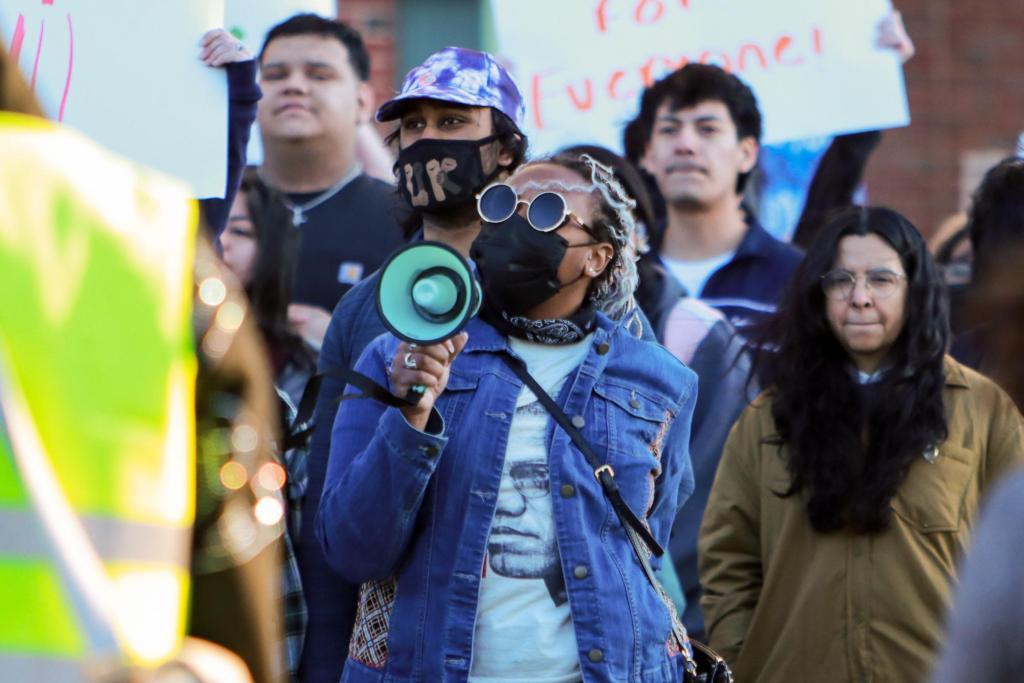
Uber wades into a fierce price war to stay competitive in India
April 8, 2025
North Carolina Lawmakers Ask for Investigation Into Funding Disruptions for Sexual Abuse Survivors
April 8, 2025Bradley Price traveled to the Kentucky governor’s office to show her support for the veto of an anti-diversity, equity, and inclusion bill. Alexandria Underwood took part in a letter-writing campaign calling for the preservation of inclusion programs on college campuses. And Savannah Dowell organized a demonstration in support of anti-discrimination efforts at Kentucky colleges and universities.
The women, each of whom are college students at the University of Louisville, say they are fighting back against President Donald Trump’s attacks on DEI programs nationwide the only way they know how: by taking the lead as student activists on their campus. They’re planning demonstrations, lobbying legislators, and engaging in civil disobedience as they try to make their voices heard.
On Thursday, the Trump administration threatened to withhold federal funding from public schools unless they verified the elimination of all DEI programs. The National Education Association, the nation’s largest teacher’s union, said that the actions will “harm students and public education.”
“Educators and parents know that teaching should be guided by what is best for students, not by threat of illegal restrictions and punishment,” Becky Pringle, president of the NEA, said in a statement.
According to the memo, state and local school officials must sign and return a certification letter within 10 days that confirms they have stopped any programs the Department of Education deems unlawful under DEI.
“We will not let those politicians distract us from the real issues facing public schools. We know what is at stake,” Pringle said. “That is why we are coming together — parents, students, and educators — to make sure every child, regardless of race, ZIP code, or family income, has the opportunities and resources they need to grow into their brilliance.”
Across the nation, those opposed to Trump’s move have responded in a range of ways, including protests, economic boycotts, and lawsuits. In Kentucky, one group of students across eight college campuses said they are doing their best to challenge his attacks on DEI.
On Louisville’s campus, that activism led to the creation of Kentucky Students for DEI. The organization is working to preserve inclusion programs not only on their campus, but at colleges and universities across the state.
“We want to get Kentucky students ready for more anti-DEI legislation, because we know they are coming after us. So we have been trying to get a bunch of student organizations across the commonwealth involved and ready to fight,” Price said.
The Trump administration’s recent executive order that calls to shutter the Department of Education adds a level of urgency and uncertainty to the students’ efforts. The president’s move is facing legal challenges, and closing the department ultimately requires approval from Congress.
Nevertheless, the students at Louisville are continuing to do what they can to make their opposition known.
One of their first priorities in the state legislature is House Bill 4. The measure is meant to ban inclusion efforts at postsecondary education institutions, including the state’s two largest institutions of higher learning, Louisville and the University of Kentucky.
It was the introduction of the bill that prompted Price and Dowell to create Kentucky Students for DEI last fall just before Election Day. Price, who is a junior and Black, and Dowell, who is a junior and white, lead the movement together.
“The language of this bill is intentionally vague, chunky, messy and sloppy,” Dowell said.
The bill not only calls for the abolition of DEI in higher education, but it also bans universities from providing scholarships, housing, admissions or differential treatment to “recipients on the basis of religion, race, sex, color or national origin.” It also eliminates any mechanisms to investigate complaints of racism or bias.
Critics of Kentucky House Bill 4 also say that the measure’s language is unclear about the guidelines and restrictions for public schools.
While the state’s Democratic governor, Andy Beshear, vetoed the bill on March 20, the Republican supermajority in the General Assembly is expected to override the veto during the current legislative session.
Members of Kentucky Students for DEI said they have to continue organizing for the protection of DEI across their state. Even before Kentucky’s legislature passed the bill, the group organized a “Day of DEI” across eight of the state’s public higher education institutions, and hundreds of students marched on campuses across the state.
“It has been four months since the bill was introduced, and now our legislative house has decided to ban DEI in Kentucky,” Price said. “What’s next? Who else’s head is on the chopping block?”

The young organizers encourage students on campus to write letters to the University of Louisville’s president, Kim E. Schatzel, about the importance of pushing back against House Bill 4. The measure could jeopardize the future of a range of inclusion initiatives, from LGBTQ+ resource centers to educational equity programs.
And if, as expected, Kentucky’s Republican supermajority overrides the governor’s veto, DEI offices, organizations, and employees from Kentucky’s public universities and colleges have until June 30 to eliminate any remnants of DEI on their campuses.
“I feel as though the Trump administration’s drive to destroy DEI programs and by extension take out women’s history, Black history, and queer history, empowers Republicans in these red states to harass, terrorize, and try to make the lives of marginalized people worse,” Price said.
Campus organizations such as UL’s Arabic Language and Culture Club, Louisville American Sign Language Association, and University of Kentucky Martin Luther King Center could close under the proposed changes.
Capital B attempted to contact the University of Louisville, but officials there had yet to respond as of publication.
Eliminating DEI nationwide
Currently, more than 240 colleges in 36 states have eliminated varying facets of DEI on their campuses, from programs to race-based student organizations, according to the Chronicle of Higher Education, which has been tracking changes in diversity policies since January 2023.
Nationwide, opposition to Trump’s actions has fueled movements to protect DEI. Students at the University of South Florida marched through Tampa, and the faculty from the University of Michigan held an “emergency meeting” to discuss the university’s decision to eliminate DEI.
Rebekah Modrak, the head of the Faculty Senate at the University of Michigan, told The New York Times that university leaders “seem determined to comply and to collaborate in our own destruction.”
Historians like Marc Robinson, a professor at California State University, San Bernardino, argue that the attacks from Trump threaten to reverse decades of progress in promoting equity for Black Americans and other groups.
“DEI programs work to address ongoing equity gaps in enrollment, retention, graduation, and subsequent employment,” Robinson said. “Rolling back DEI initiatives would mean regressing to an educational system that is less accessible and less fair. This would ultimately damage educational institutions, our national workforce, our democracy, and much more.”
In February, the Trump administration gave public schools and universities two weeks to either eliminate DEI initiatives or risk losing federal funding. Just a few days later, a federal judge blocked the executive order and several other anti-DEI plans.
The Department of Education is continuing to be targeted by Republicans.
U.S. Rep. Thomas Massie, a Republican representing Kentucky, reintroduced a bill that seeks to abolish the U.S. Department of Education. His brief bill seeks to abolish the Department of Education on Dec. 31, 2026.
Through Trump’s first 60 days in office, sweeping changes have been made to the Department of Education.
Linda McMahon was confirmed as the secretary of the department, key offices within the agency were closed, and 1,300 employees were laid off.
Then a Department of Education memo notified schools and universities about the Trump administration’s order, encouraging schools to cease using “racial preferences” in admissions, financial aid, or hiring. It said that “educational institutions may neither separate nor segregate students based on race, nor distribute benefits or burdens based on race.”
The memo also stated that ending standardized testing requirements for colleges and universities “to achieve a desired racial balance or to increase racial diversity” is unlawful — even though more than 300 higher education institutions have eliminated SAT and ACT scores as a requirement in their admissions process.
“Schools have been operating on the pretext that selecting students for ‘diversity’ or similar euphemisms is not selecting them based on race,” said Craig Trainor, the acting assistant secretary for civil rights. “No longer. Students should be assessed according to merit, accomplishment and character.”
Some education advocates, including Pringle of the NEA, contend the administration’s actions are not legal. The NEA and the American Civil Liberties Union sued the Department of Education on March 5.
“We’ve got to make sure that people understand this is not legal,” Pringle said in an interview.
The lawsuit argues that the Trump administration’s actions violate due process guidelines and the First Amendment.
“We’re urging the court to block the Department of Education from enforcing this harmful and vague directive and protect students from politically motivated attacks that stifle speech and erase critical lessons,” Pringle said. “Teaching should be guided by what’s best for students, not by threat of illegal restrictions and punishment.”
Pringle said that policies set by state lawmakers and local school districts across the country prohibit the many anti-DEI executive orders, according to collective bargaining agreements presented by unions like the NEA.

Underwood, a graduate student at the University of Louisville and organizer with Kentucky Students for DEI, knows the fear of possibly losing DEI initiatives on her campus.
“When you take these great initiatives and great people away, what does our support system look like?” Underwood said. “That’s truly why we’ve been advocating, because the most important people in our lives that have helped us become successful at our schools are the ones that are in the most jeopardy of losing their career and organizations.”
In May, she will graduate with two master’s degrees in social work — degrees that Underwood said could be in jeopardy if House Bill 4 and Trump’s executive orders take effect due to the vague nature of both pieces of legislation and similarities of DEI and social work.
Since House Bill 4 was introduced, students on Louisville’s campus have begun seeing changes. The name of their DEI offices have been changed to the Office of Institutional Equity. Some graduate students, like Underwood, have paused research for fear of its viability after anti-DEI legislation begins to take effect.
“Everything I did in my four years here could be in vain just because I simply want to use my First Amendment rights to freedom of speech,” added Underwood. “All because I feel my worth and my identity is being attacked, I think that’s very deplorable that these universities would comply.”
Great Job Alexis Wray & the Team @ Capital B News Source link for sharing this story.





